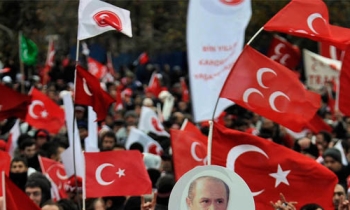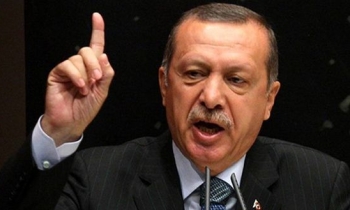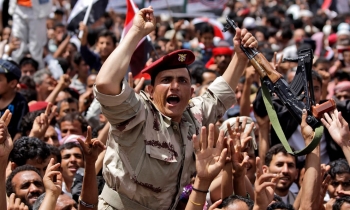Two journalists have been freed in Yemen during the past 24 hours. Al-Ayyam editor Hani Bashraheel, who was arrested on January 6, and Moaz Ashhabi, who was sentenced to a year in prison on January 16, were freed on Monday, according to Reporters sans Frontières (RSF).
But a harsh crackdown on independent and opposition media continues, with another journalist, Hossein Al-Leswas, getting a one-year sentence last week and more trials due to be held in the coming weeks.
The former editor of the Sanaa Press website and owner of the newspaper Al-Tajdid, Al-Leswas was convicted by Judge Mansur Al-Sha’e of the Sana'a special court for press and publication offences on May 2 for articles about alleged corruption within the Al-Bayda province power company.
He was taken from the court to Sana'a’s main prison to begin serving his jail sentence, which will be followed by a one-year ban on working as a journalist. His appeal against his conviction was due to be held on May 8, but it has been postponed without a new date being set.
Al-Leswas, who has specialised in investigation corruption, said he had documents that proved there was corruption within the power company, and he asked the judge to order the two men who had filed the libel suit against him, the head of the company and the provincial governor, to appear in court. The judge refused on the grounds that the court handled only press cases. The authorities did not investigate the corruption allegations.
Al-Leswas was physically attacked by the governor’s bodyguards in January 2009 following an article about the governor’s alleged involvement in other cases of corruption.
On May 3, the day after the trial, the Mukhabarat (intelligence services) arrested Abdelsalam Mutabaq, the editor of the Al-Bayda Press website, for calling for Al-Leswas’ release. After being held in a Mukhabarat detention centre, he was transferred to Al-Bayda’s main prison.
The editor of the independent weekly Al-Masdar, Samir Jubran, and four of his journalists – Sami Al-Kaf, Abdelrazeq Al-Jamal, Abelmalek Al-Mathil and Mohammed Al-‘Ala’i – are due to go on trial on May 18 on charges of disturbing public order, inciting regionalism and threatening national unity.
Another Al-Masdar journalist, Munir Al-Mawari, was sentenced by the special press court on October 31 to two years in prison and lifelong ban on working as a journalist for libelling the president in a May 2009 article headlined “Weapon of mass destruction” that criticised the conduct of the war against Shiite rebels in the north of the country. The editor, Jubran, was given a one-year suspended jail sentence in the same case, as well as a one-year work ban.
Fakri Qassem, the editor of the newspaper Taez-based newspaper Hadith Al-Madena, did not show for the court hearing he was ordered to attend on April 27 and is now regarded as a fugitive from justice. The nature of the case that was to have been heard is not known.
The newspaper Al-Tajamu’ is meanwhile being prosecuted on charges of inciting regionalism and threatening national unity.
The trial of Mohamed Al-Maqalih, the editor of the opposition Socialist Party’s news website, Al-Eshteraki, was adjourned indefinitely on April 18. The trial of two other journalists – Fouad Rashid, editor of the Al Mukalla Press website (arrested on May 4, 2009) and Salah Al-Saqladi, the editor of the Adengulf website (arrested his Aden home on June 18, 2009 – is due to begin on May 23. Ahmed Al-Rabizi, an activist arrested in Aden on May 12, 2009, will go on trial with them.
Faysal Mubarak, Al-Jazeera’s correspondent in Abyân province (southeast of Sanaa), was arrested on April 27 while covering a demonstration marking the 1994 war in the town of Lawdar. The security forces confiscated his camera, video cassettes and mobile phone and held him for several hours in Zinjubar’s main prison before letting him go.









